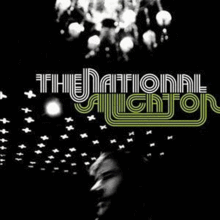It’s hard to believe but The National‘s third and possibly most cathartic and direct record ‘Alligator’ is ten years old this month. Their first on a major label like Beggars Banquet, and with songs like the memorable single ‘Abel’, the urgent ‘Lit Up’ the inspired ‘Mr November’ and the twisted sexual darkness of ‘Karen’. It heralded their hitherto unstoppable assent to their current position as master purveyors of popular quality resonant song writing that grows in depth and emotional potency with each repeated listen. ‘Alligator’ was just the start of their journey into the bosoms of our hearts. Today we celebrate its tenth birthday with our original review and two excerpts from our interviews with the band.
Ten years ago our man Mike Mantin reviewed the record here’s what he wrote:
“‘ Alligator’ is Brooklyn’s the National’s third album, their first on a major label and hopefully the one which will throw them into the mainstream, and deservedly so. It should float the boats of fans of dark, brooding post-punk (opener ‘Secret Meeting) and introspective Americana (the beautiful ‘Daughters Of The Soho Riots) alike. There’s even a bit of welcome shouting thrown in, on fantastic single ‘Abel’.
Alligator’ is Brooklyn’s the National’s third album, their first on a major label and hopefully the one which will throw them into the mainstream, and deservedly so. It should float the boats of fans of dark, brooding post-punk (opener ‘Secret Meeting) and introspective Americana (the beautiful ‘Daughters Of The Soho Riots) alike. There’s even a bit of welcome shouting thrown in, on fantastic single ‘Abel’.
Matt Berninger provides deep, soothing vocals reminiscent of Ian Curtis and, more recently, Interpol’s Paul Banks, which slot in perfectly with the high-pitch guitar noises. But the range of styles and oblique lyrics suggest there’s far more on offer here than moody alt-rock. Berninger turns alt-country strummer ‘Karen’ into a medium for his deepest thoughts and sexual confessions. You’ll notice the breezy tune first and the interesting lyrics (‘Karen, put me in a chair, fuck me and make me a drink’ and even more disturbing, ‘It’s a common fetish for a doting man to ballerina on the coffee table, cock in hand’ second, giving the album substantial replay value.
Almost every track on this mini masterpiece is intriguing and listenable and there are highlights in abundance. ‘Abel’ boasts a great sing-along chorus of ‘My mind’s not right!’ amidst simple indie-rock verses, while closer ‘Mr November’ documents their (clearly failed) rush to get the album completed before the November elections with its line ‘The English are waiting and I don’t know what to do/ In my best clothes’ before just about getting away with saying ‘I’m the new blue blood, I’m the great white hop’, because it might just be true. ‘Val Jester’ and ‘Daughters Of The Soho Riots’ are both gorgeous slower songs unafraid to delve into strange personal love experiences and fantasies. Tuneful and poetic, ‘Alligator’ is truly an album to cherish. “
In 2007 Mike followed up that review with a interview with The National’s bassist Aaron Dessner …it came during the period of the release of Alligator’s superb follow up record ‘Boxer’…
The situation when writing it must have been different considering the amount of attention ‘Alligator’ received. How much did this affect the process of writing and recording the album? Did you feel under any pressure to deliver a follow-up?
I don’t think we felt pressure from outside. We’re a very collaborative band, so we can’t really worry about the outside world, there would be no way for us to endeavour to write an album that would compete with ‘Alligator’, that’s the way it is, we’re happy with it, we feel it’s different and better than anything we’ve done before.
But do you feel there’s a sense of continuity between the two records?
Yeah, it makes sense that it goes from ‘Alligator’ but this process shows the band getting better at its craft, we’re glad we didn’t make Alligator 2.
Many people called ‘Alligator’ a ‘grower’. A lot of the tracks on ‘Boxer’, I think, are very subtle and layered, with the listener noticing new things each time. Do you think this one will be described as a ‘grower’ as well?
I think the kind of songs that we write, Matt [Berninger, lead singer] especially, try to avoid obvious hooks. Sometimes Matt’s sense of melody is subtle but it creeps up on you, some of it’s the natural chemistry of the band creeps up on you too. We arrange the songs on purpose to unfold, in the orchestral details you don’t notice everything on the first listen, the songs expand, to be honest every record I love would be what I call a ‘grower: it’s not something that immediately hits me, it’s albums that you live with and can come back to after months, the test of a great album is that you notice it over time.
Do you think that explains all the comparisons to people like Tom Waits?
Yeah, everyone loves him, Matt also loves Nick Cave and Dylan, we all share a lot of reference points
How do your songs come together? Do the rest of the band have a say in Matt’s lyrics?
It’s definitely his contribution to the band to write the lyrics, but it’s back and forth. He gives us a lot of feedback about the music and influences the direction it takes. If there’s something that rubs us the wrong way we’ll tell him, if he does something we don’t feel that strongly about we’ll tell him or he’ll figure it out on his own, there’s also lyrics he’s written for another song that we’ll use, there are a few songs that are drawing on old sketches we used long ago.
Yeah, I noticed that, so the lyrical references to past songs are deliberate?
Yeah there’s things like the ’29 Years’ [a song on The National’s first album] reference, the way it appeared on our first album it was a recording that Matt had done on his own without ‘proper’ instrumentation. When we were writing the song ‘Slow Show’ we went through many variations with different lyrics and different parts and I think when I came up with the melody at the end which is like a coda, it felt like the song was taking a left turn, for some reason it came into my head to put those words against this melody, to reappear, it just clicked, he just went in and did it, we have accidents like that.

In 2010, GIITTV’s Rhian Daly caught up with The National’s main songwriters Matt Berninger and Aaron Dessner on the eve of the release of ‘High Violet,’ she asked them about the comparisons between that record and ‘Alligator’ and ‘Boxer’...
High Violet seems to be more reminiscent of Alligator than anything else.
MB: It’s less like Boxer than… it has catharsis, it has release. Boxer had a lot of tension that was never released. This record is uglier than that, and gets louder and explodes a little more. So it has certain things that Boxer didn’t and that was on purpose that Boxer didn’t have that stuff. Is it like Alligator? In some ways. It’s also our most musically complicated and developed record, I think. Some of the songs may sound very home made and lo-fi but what’s happening in them is the most sophisticated arrangements… sophisticated is a weird word to use.. but more adventurous arrangements. We worked a meticulous weaving of flutes and strings and clarinets into there along with ugly, distorted, mushy-sounding guitars and drums recorded with one microphone and stuff like that. So we’ve woven together some very lo-fi things and ugly sounds with some very delicate chamber music and arrangements and stuff. So I would say it’s different to Alligator and more like Boxer at least on a level of musical academically… interesting things, maybe. But much more so than even Boxer. It’s got sides of both. It’s the child of both of those records, maybe.
AD: It’s a weird mix of Boxer and Alligator and other things. I think it’s new in the sense that Matt is singing out a lot more than he ever has, and he’s singing at the top of his range. Musically, it is more cathartic like Alligator – whereas Boxer’s more restrained. I think it’s kind of more of an experimental record although we’re mostly interested in songwriting not production or experimenting for the sake of experimenting. But there it’s not as normative, or as straightforward as Alligator is. So in that sense I don’t think it’s like Alligator. This record has a blurrier, weirder sound but it is similar in the sense that it rocks a lot, and musically at times is intense. So yeah, it’s more like Alligator than Boxer. But I think the most important thing for us is that we don’t repeat ourselves, so that’s the main thing you think about when you’re making records.
It sounds more confident than your other records…
MB: We knew that following up Alligator was a tough thing. It was the first record that anybody on a whole other level paid any attention to and it seemed like the thing they were paying attention to the most were the screaming songs like ‘Mr November’ and ‘Abel’. So following that up was tough, because we purposely didn’t want to paint ourselves into a corner by doing more of that and being the band with the guy who screams his head off. We didn’t want to be that band because there’s more to it than that. So Boxer was a lot of anxiety to follow up Alligator and to do it in a way that was going to release us from any kind of expectations. And that paid off. The fact that it paid off and Boxer did well, sold a lot more. You know, people have debates over which album is better, so to at least prove that we could avoid what we’d done in the past and still connect with a great record… So we knew that’s all we had to do this time. Just make something awesome. We didn’t know what that was going to be or what people were hoping or expecting for, or what trends were going on musically in indie rock – we knew none of that would ever helps us make a record so we didn’t. It was all just about making ourselves really excited and finding songs that we loved and we thought were awesome was really all we had to worry about. That’s all we did worry about it.
In the industry nowadays, bands are picked up and signed etc before they’ve barely formed and aren’t really given time to develop. You’ve had a lot of space and time to grow without ridiculous amounts of media hype, though. Do you think the devotion you inspire in your fans is a direct consequence of that?
MB: I think that our records – and we’ve been told this so it must be true – are growers and they take a while for people to connect to. It was never on purpose but it makes sense to us because the songs that end up on our records are the songs that aren’t always the most accessible and instant, and took us a while to feel connected too and the ones that have lasted for us. So the fact that the songs that are on the records are the ones that, after working on a record for months and months, sometimes a year/year and a half, we feel really personally connected to the ones that make it on to the record that’s why it makes sense that there’s this progression in the relationship people have to our songs. By not getting any attention for a long time has allowed us to not take for granted how hard it is to get any to pay attention or care about your music. You got to put the work in, you’ve got to have great music. You’ve got to work hard and not put out a record until it’s something awesome and so we really respect that and value that, and not squander that. We do know how easy and how quickly you can get a lot of attention and how quickly that attention just disappears. We’ve always been a little terrified of every little bit of attention we’ve gotten, even before Alligator. We were so afraid of losing it. In some ways, we felt like we had something to prove and we wanted to put our stake in the ground. But we’ve been hungry and we’ve stayed hungry for a long time because we never exploded. So now we’re getting a lot of attention, there’s something about just realising how much you’ve got to value that and it’s not something that you can count on so you’ve got to deliver.
AD: I think it could have gone the other way and maybe that would have been good but I do think one of the reasons why we’re where we are today – which is a lucky place to be which is we’re more of a back alley whisper kind of band and we’re quite a big band now – is because we earned it, one fan at a time. We had supporters. We’ve always had supporters, pretty vocal ones in different countries and stuff that have come out and said… now, it’s becoming more like we have media coverage but we never really… at the end of Alligator we were on Jools Holland which helped, or Uncut said Sad Songs for Dirty Lovers was brilliant. We’ve had our isolated little supporters but by and large we haven’t benefitted from media and we haven’t been a trendy band that’s blown up, and I think that’s meant that we’ve had to work really hard and that we didn’t suffer from over-exposure. We’ve been allowed to grow at our own pace and there’s a lot of depth… Like, when you come to see the National play, we don’t just play the hit single and then people leave. I don’t know what we would do if we were that kind of band that had those fans who knew something from the radio. We’re a band that makes albums and when we play live it’s like a whole experience and for us to enjoy it, I think it’s important for us to have that kind of relationship with the fans where it’s kind of intense. It feels like we’re all in this experience together when we play shows and every song on the playlist matters, in a weird way. It’s not just about a few songs. So I’m thankful for that.
Sometimes we say ‘Oh, I wish our records were more immediate or something but it’s not that they’re not catchy. It’s just that they have many layers that unfold over time. So it just takes a second for people to figure it out. And we don’t make obvious choices sometimes, I guess, because we get sick of those. I hope people don’t say that this one’s a grower but it seems like people just like saying that about us. They are catchy! The beat’s good, the lyrics are catchy, the music’s beautiful. It’s not that hard to like! But everyone’s like ‘It’s a grower’. Is that because it doesn’t sound like Arctic Monkeys or something, or what?! Mainly the grower term comes from England. I think it’s like English rock might be more catchier or immediate. Like, the things that get really big here. Although then you have Radiohead who aren’t that easy… hopefully now people will stop saying that.



